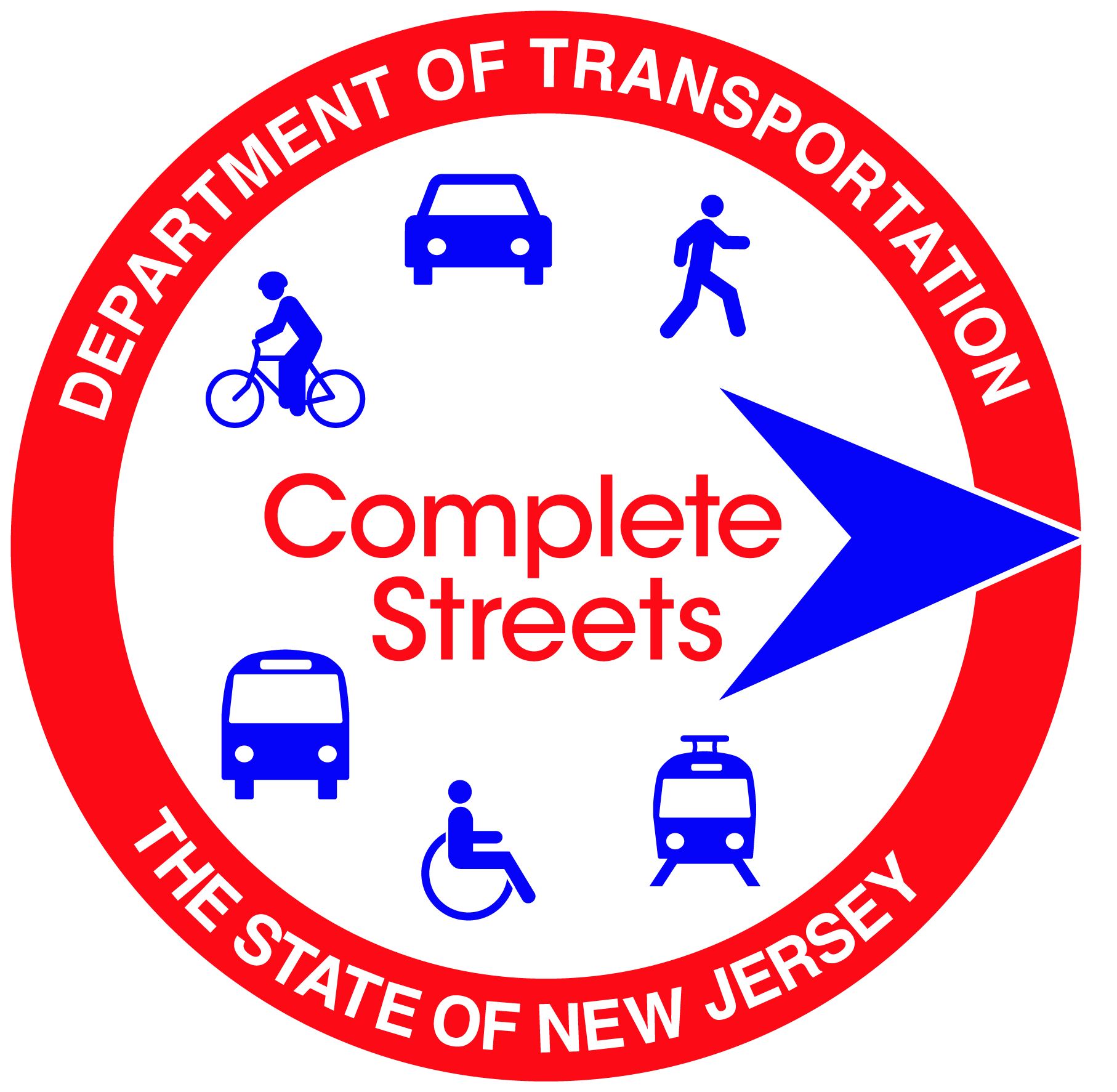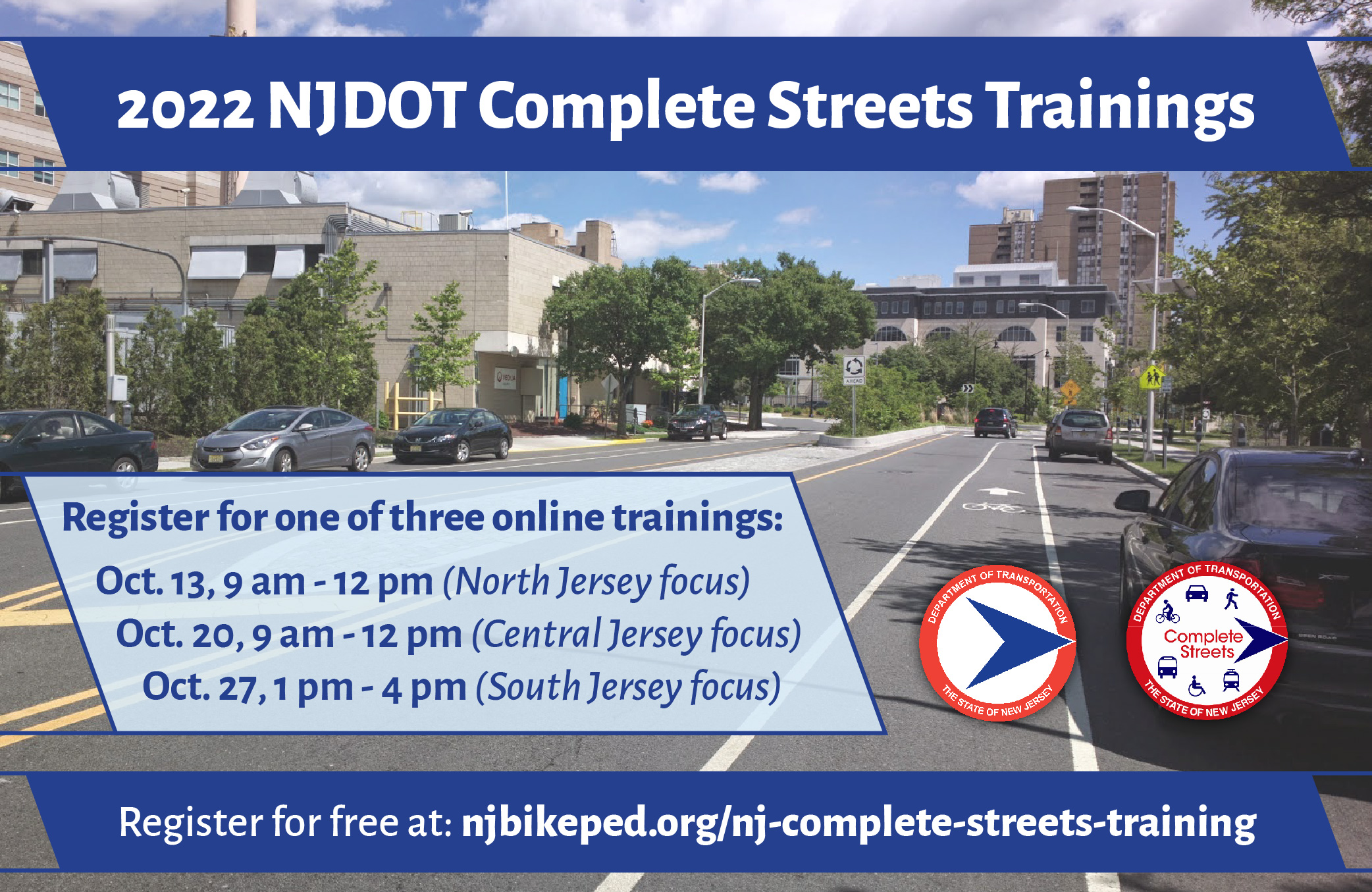NJ Complete Streets Training
2024-2025 Training: Implementing Complete Streets at the Local Level
Complete Streets are designed for all users, all abilities, and all modes of transportation. They respond to local needs and context, such as roadway type, topography, natural features, density of development, adjacent land use, and street connectivity. SJTPO sponsored two interactive training sessions covering all aspects of Complete Streets.
Training 1: What are Complete Streets and How to Craft and Implement an Effective Municipal Policy
View webinar recording here!
Learn how to create and adopt your own custom municipal Complete & Green Streets Policy! This online-only session was designed for planners, advocates, public health professionals, policymakers, elected officials, and anyone looking to learn more about Complete and Green Streets and how to adopt and implement a policy to design safer, greener, and more accessible streets for your community.
During the webinar we provided detail information on the following:
- What are Complete Streets and the costs of incomplete streets
- Policy paradigms for safer streets and how to achieve zero deaths
- What needs to be included in a municipal policy to ensure effective implementation
- How to get local buy-in and policy stewardship
This training meets requirements for 1.5 AICP Certification Maintenance (CM) credits for licensed professional planners.
Thursday, January 23, 2025, 12:00pm-1:30pm
Training 2: Complete Streets Design, Funding and Implementation
Learn about the latest design guidance for creating safer roadways for all users and which funding sources are available to support implementation. This in-person-only training session was designed for engineers, planners, advocates, elected officials, and anyone looking to learn more about building safer streets.
This in-person interactive workshop focused on the following topics:
- The latest state and federal design guidance
- Considerations of local context
- The Safe System Approach
- Proven Safety Countermeasures
- Temporary Demonstration Projects
- Review of key funding opportunities
This training meets requirements for three AICP Certification Maintenance (CM) credits for licensed professional planners.
Thursday, January 30, 2025, 1:00pm-4:00pm
Rowan College of South Jersey – Cumberland County
The trainings are a collaborative effort by the South Jersey Transportation Planning Organization (SJTPO), the Alan M. Voorhees Transportation Center at Rutgers University, Sustainable Jersey and Cross County Connection Transportation Management Association (CCCTMA).

Complete Streets are designed for all users, all modes of transportation, and all abilities. They respond to local needs and context, such as roadway type, topography, natural features, density of development, adjacent land use, and street connectivity. The NJDOT-sponsored 3-hour online Complete Streets training consists of three modules covering all the basics of Complete Streets from the benefits to the planning to the design elements needed to implement them in your community. The training is designed for planners, engineers, advocates, public health professionals, policymakers, elected officials, and anyone looking to learn more about Complete and Green Streets. Participants of this course will better understand:
- The benefits of implementing Complete Streets.
- The evolution of Complete Streets as a safety strategy, policy, and planning and design concept, including emerging trends that are informing how we think about Complete Streets.
- The integration of planning and placemaking with Complete Streets and the vast opportunities to make places safer and more livable through these synergies.
- Best practices for Complete and Green Streets design guidance.

2022 Training
Three online trainings were held in 2022. Each training focused on a different region of the state, but all sessions covered the same basic principles and were open to everyone. PDF versions of the 2022 training slides are linked below:
If you use any portion of the training content, we request that you cite NJDOT Complete Streets Training, Fall 2022.
Session 1
Thursday, October 13, 2022, 9 am – 12 pm
North Jersey focus
- Bergen County
- Essex County
- Hudson County
- Morris County
- Passaic County
- Sussex County
- Warren County
Session 2
Thursday, October 20, 2022, 9 am – 12 pm
Central Jersey focus
- Hunterdon County
- Mercer County
- Middlesex County
- Monmouth County
- Ocean County
- Somerset County
- Union County
Session 3
Thursday, October 27, 2022, 1 pm – 4 pm
South Jersey focus
- Atlantic County
- Burlington County
- Camden County
- Cumberland County
- Cape May County
- Gloucester County
- Salem County
This training meets requirements for three AICP Certification Maintenance (CM) credits for licensed professional planners and NJ Board of Architects continuing education credits. Professional development hours (PDHs) for licensed professional engineers are also available. For AICP CM information, please see the links below:
Who Should Attend
Complete Streets training is open to anyone interested in learning about and supporting efforts to expand Complete Streets initiatives across New Jersey. Examples include:
- State, county, and municipal planners, engineers, and public works staff
- Public health professionals
- Policy-makers and elected officials
- Local bike/walk & Safe Routes to School champions
- Mobility, accessibility, and equity advocates
- Environmental and economic development professionals
- Anyone interested in designing for active transportation systems that protect the safety of all roadway users

Course Outline
Module 1 – Benefits
Module 1 focuses on WHY Complete Streets are important and their far-reaching benefits, including safety, resiliency, equity, and health, and best practices for Complete Streets policies and procedures. This module covers the fundamentals of Complete Streets: what they are, how they reflect local contexts, the high costs of “incomplete” streets, the benefits of implementation, recent emerging trends, and how to advance Complete Streets policies in your own community.
Module 2 – Planning
Module 2 describes WHAT goes into planning for a balanced network of Complete Streets in a community, including deploying demonstration projects and understanding local context. This module describes the planning stage of the implementation process: why planning beforehand is essential, community collaboration, planning and zoning for Complete Streets, using data to measure success and target projects for the greatest impact, and how to educate staff and the general public.
Module 3 – Design
Module 3 focuses on HOW to design a Complete Streets project within the context of a community and includes an interactive project development and design exercise. This module describes the design stage of the implementation process: defining a clear vision and achievable goals, understanding local context and diverse travel needs, assessing overall system performance, and the Safe Systems Approach, including FHWA Proven Safety Countermeasures. This module also examines street typologies within the New Jersey Complete Streets Design Guide.
Click here to download a handout with links to Complete Streets resources covered in the training.
Trainers
Click below to learn more about each of the trainers.








